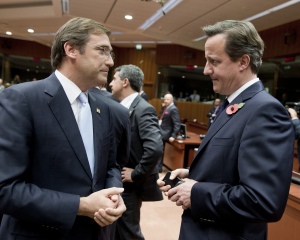Last week British Prime Minister David Cameron delivered the latest in his string of ‘European renegotiation’ promises: a pledge to renegotiate immigration policy with the European Union (EU). Unfortunately, along with many of its predecessors, this promise is likely to disappear when next month’s popular political view of the month is announced. This article assesses why I believe this will happen.
Established as the European Coal and Steel Community (ECSC) in 1953, the now European Union promotes objectives which dwarf the ECSC’s simple reason for commencement: preventing a future world war. The most recent development in the growth of this parasitic super nation arose from the Treaty of Lisbon in 2009, which simplified the written workings of the EU into two key agreements: the ‘Treaty on the European Union’ (TEU) and the ‘Treaty on the Functioning of the European Union’ (TFEU). However, whilst this development illustrates the intentional (and predicted) growth of the EU into a more politicised and controlling organisation, the establishment of an ‘internal market’ remains at the core of its operation.
It is due to this ‘core operation’ that Mr Cameron’s latest promise will be even more difficult to achieve than the elimination of ‘red-tape bureaucracy’ which has historically dominated the Conservatives’ EU agenda. Both treaties directly oppose such a renegotiation. Article 3(2) of the TEU provides that the EU shall offer its citizens an area without internal barriers to the free movement of persons, whilst Article 26 of the TFEU provides again for a lack of frontiers in an internal market, allowing the free movement of goods, persons, services and capital. Directly contravening the most important aim of the EU will not be an easy task for Mr Cameron.

In practice, Mr Cameron may express his views at meetings of the European Council, to an audience of leaders representing all EU member states. However, in order to effect a change, either the Treaty of Lisbon will need to be modified, or a legal measure will have to be produced allowing the UK to become exempt from the free movement of persons aspect of the internal market. In either case, this cannot be unilaterally effected, nor effected without the intervention of other institutions. Given the simplification of voting procedures within all of the major EU institutions, at minimum, such a change or measure will require at least the approval of a qualified majority in multiple institutions. In short, the UK would need other member states as allies. Considering that the UK currently has one of the strongest economies in the EU, it would seem illogical for other states to approve a measure which could only be a detriment to their own welfare. This is aside from consideration of the precedents which such an approval would set.
There could be one silver lining for Mr Cameron however: differentiated integration. If, in the unlikely event, he could generate allies within the EU, there is the potential for a group of states to opt-out of measures; the Euro for instance. However, once again, economic considerations would no doubt prevent such an opportunity.
To conclude, it would require more than politics to renegotiate the UK’s position on the free movement of persons within the internal market. It would seem that the only way for the UK to introduce viable and intra-vires legislation to curb immigration follows an exit from the EU; the potential for which was conveniently provided for in the Treaty of Lisbon. It is submitted that the immigration debate may not be treated as a singular issue, but rather as part of the wider in/out debate, which I wish not to touch upon in this article. Although it could simply be that Mr Cameron’s latest promise is a meritless reaction to the rapidly changing political landscape in the UK.
Cover image source: Flickr, The Prime Minister’s Office, Immigration Operation Album, Paul Shaw. Secondary image source: Flickr, The European Council. Images reproduced under the Creative Commons Licence.